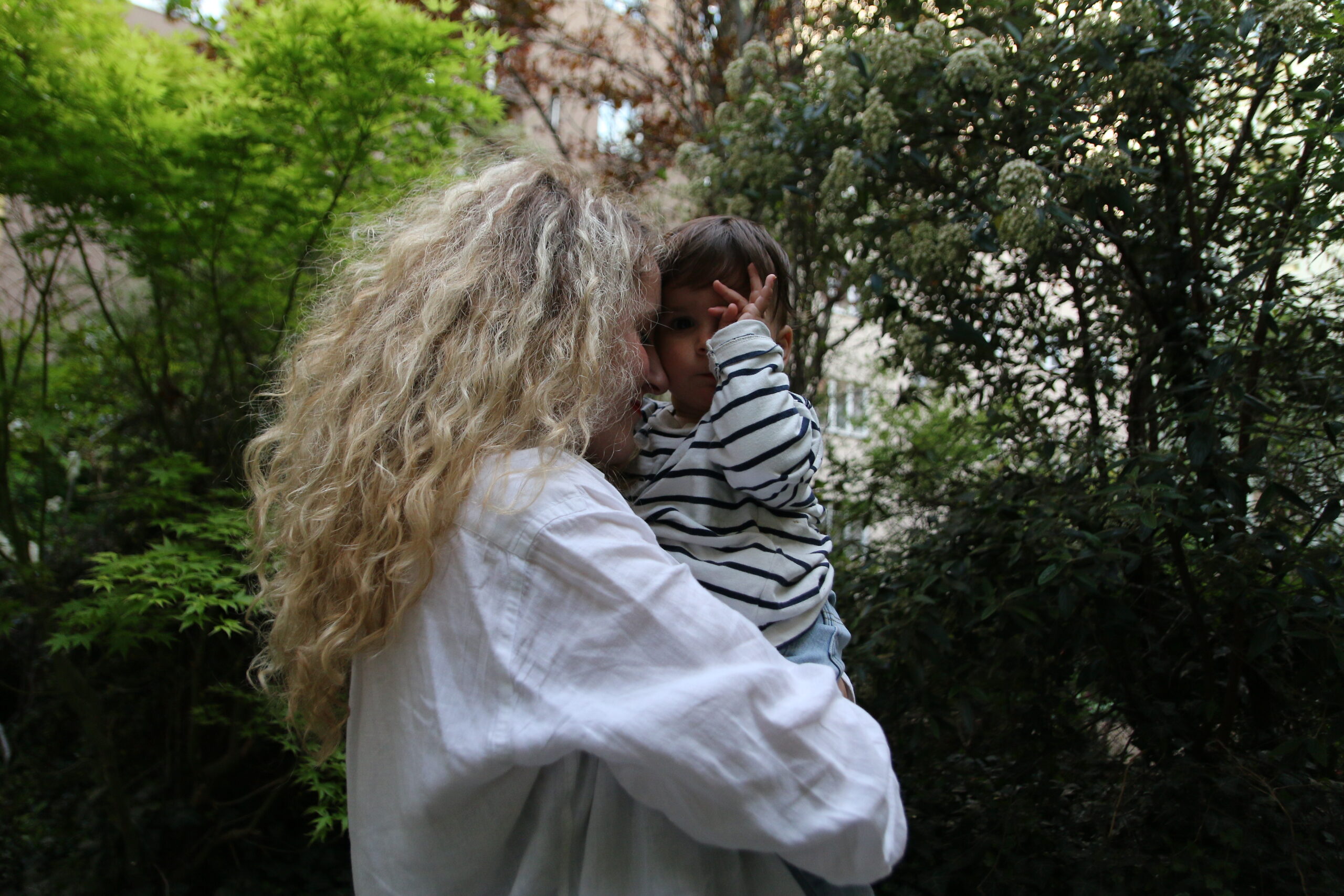
‘I don’t care about the mother anymore, only about the baby’
After giving birth, a mother’s mental health remains overshadowed by expectations, neglect and stigma.
By Donika Gashi — 5/5/2025
I found out I was pregnant exactly one month after starting my master’s studies in Aarhus, Denmark. It was not the news I was expecting, for many reasons. Due to Polycystic Ovary Syndrome (PCOS), I had been told for years by gynecologists that I would need treatment in order to get pregnant as it would otherwise be nearly impossible. PCOS is a hormonal disorder that often causes irregular menstrual cycles and is one of the most common causes of infertility in women. Additionally, I had just embarked on a journey that was expected to last two years, I hadn’t imagined I would be facing such a major life change at that moment.
However, I didn’t want to give up either. I gathered all my strength to face this period alone. I had no other choice: I had to study, shop, attend lectures, walk as much as possible and fulfill every obligation — all without having my partner, family or friends nearby. I focused all my energy on figuring out how to manage the pregnancy without harming myself or the baby. In Aarhus, there were courses for pregnant women on childbirth, stress management and newborn care, but since I didn’t speak Danish, I couldn’t attend any of them.
I had my check-ups at the clinic where I was registered. I was informed that in the seventh month, as part of their medical protocol, I would need to meet with a social worker to talk more about pregnancy and mental health. I remember crying during that conversation because in my mind, motherhood was inherently tied to sacrifice — even self-sacrifice — and I didn’t want that kind of parenting.
The social worker gently explained to me that there isn’t just one way to be a parent and that, once the baby was born, I would gradually come to understand my own approach to parenting. During our conversation, she also told me about baby blues and postpartum depression. She said that in the first few weeks, whatever I might feel, I should accept it as normal — because it is. That conversation reassured me and helped me begin to process the fact that I was about to become a mother.
Very shortly after that conversation, I returned to Kosovo, where I gave birth.
***
The idea that I would now be responsible for caring for another human being terrified me from the moment I left the delivery room. In that instant, I remembered the social worker’s words. This contrasted with the midwife at the private hospital, where I gave birth. While she was instructing me on how to breastfeed, with a smile and a certain pride, she said “I don’t care about the mother anymore, only about the baby.” I felt undone in that moment — as if I had stopped existing. I was no longer myself, no longer important. And with those thoughts came guilt. I felt guilty for thinking that way. I felt selfish. A bad mother. The more I tried to suppress those thoughts, the stronger they came back.
I had never experienced that level of stress before. It peaked 72 hours after giving birth. I didn’t recognize myself or my body — everything felt unfamiliar, as if I had lost touch with reality. I found myself mourning the life I had before. Then came the guilt for even having that thought and I cried uncontrollably. From what I had read, I understood that I was experiencing the baby blues. Baby blues are typically associated with low mood and mild depressive symptoms, which can appear in the first few days after childbirth and usually last between two to four weeks. If the symptoms persist beyond that, they may indicate postnatal depression. According to studies, baby blues affect about 39% of women globally after giving birth, although this number varies significantly — from 13.7% to 76% — depending on the culture and country of origin.
To top it all off, in those early days, my milk ducts became blocked. The pain kept getting worse, and the only thing I kept hearing was, “You have to endure the pain, there’s nothing like mother’s milk.” This didn’t help at all. On the contrary, it only added to the pressure. This kind of pressure isn’t just a personal feeling — breastfeeding difficulties can take a serious toll on a mother’s mental well-being.
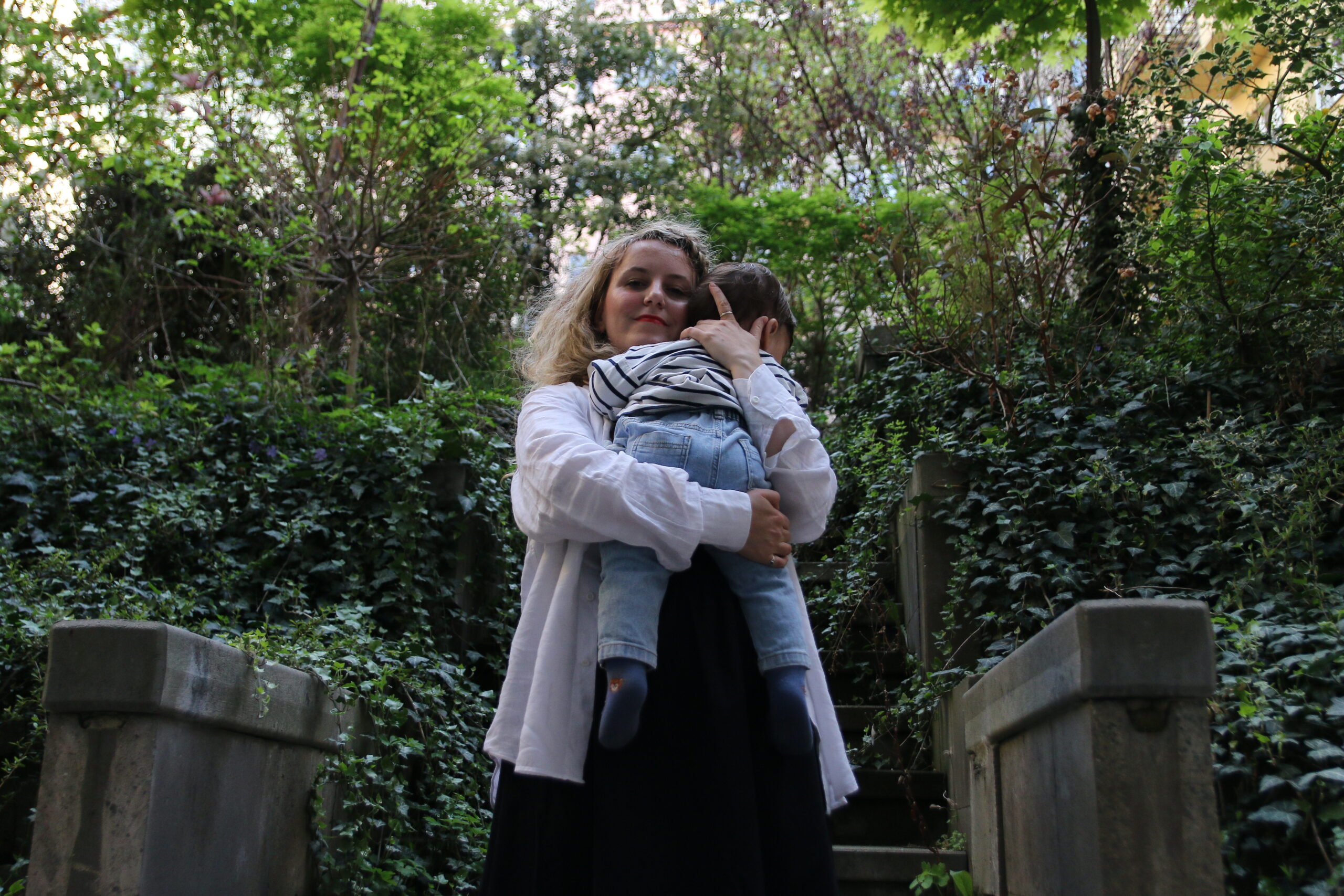
While searching online for help with breastfeeding, I came across the name of Rina Demiri Spahija, the director of Action for Mothers and Children (AMC) — an organization dedicated to the health of babies, mothers and children. I immediately decided to contact her about my problem. As soon as she answered the phone, I broke down in tears like never before. She understood me completely and advised me on what to do until I could see a doctor the following day.
The physical pain subsided after about a week, but what weighed on me most was the emotional toll. My mind and body were on high alert. I was constantly checking to see if the baby was breathing. My body would shake. I didn’t want anyone else to hold the baby. I was terrified that something might happen to the baby — or to me. I would wake up in the middle of the night, gripped by anxiety, afraid that I had accidentally suffocated the baby. I cried a lot.
I thought about all the women in my circle who had gone through this journey before me. I realized that, without knowing it, I had been unfair to them. I remembered my best friend, Donika, when she first became a mother. At the time, I believed I was supporting her but now I understood that I hadn’t truly grasped what she was going through.
It wasn’t until I called Demiri Spahija, three days after giving birth, that I felt someone was finally validating my feelings — telling me that everything I was experiencing was normal. That was all I needed at that moment.
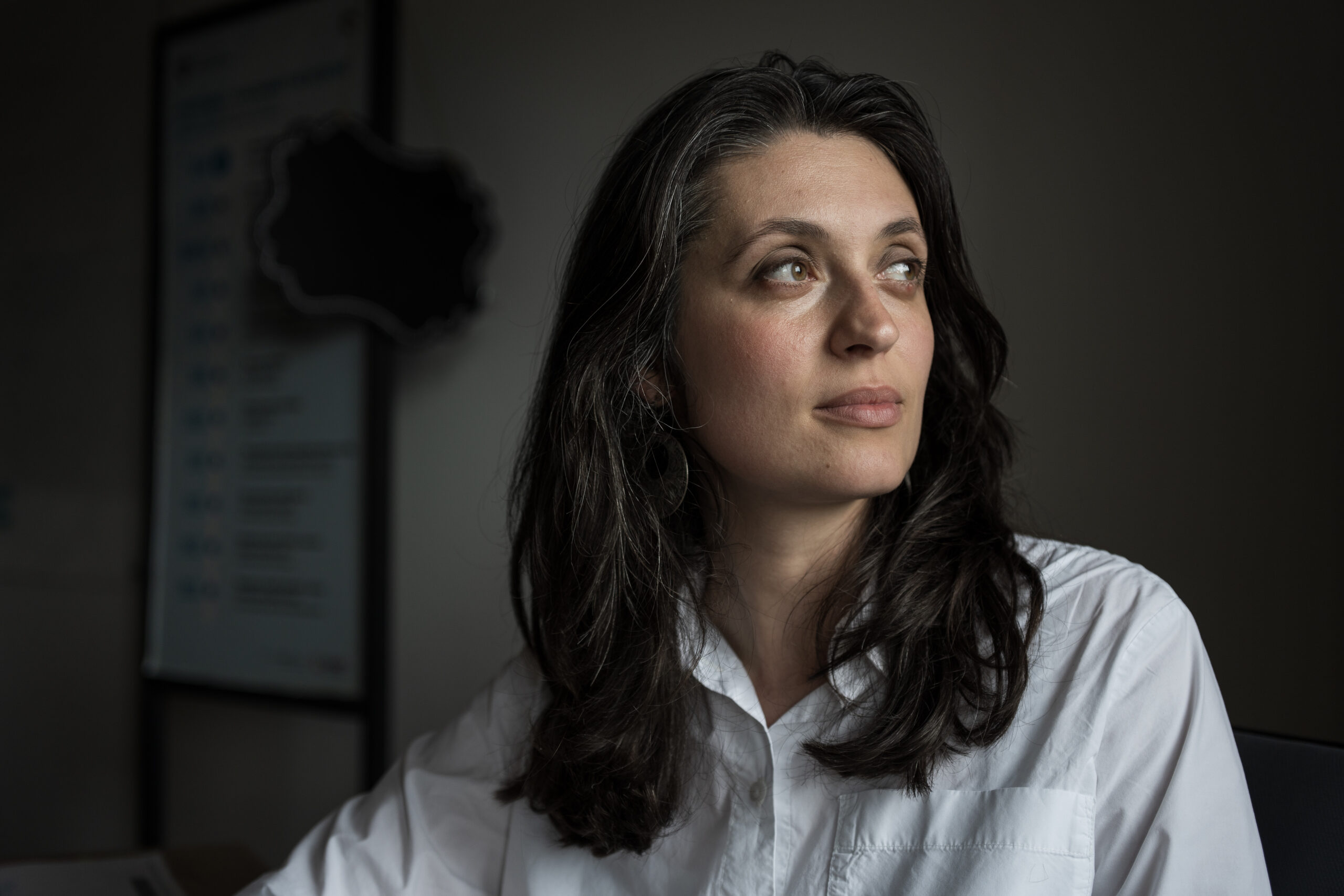
Photo: Ferdi Limani / K2.0
“Donika, due to the difficulties and anxiety of postpartum, I completely changed my profession,” she told me that day over the phone. Now, 10 months later — in a conversation between me as a journalist and Demiri Spahija as the director of AMC — Demiri Spahija told me about the projects the organization is working on in collaboration with the Ministry of Health and UNICEF.
One of these initiatives is the program “Home Visits for Children 0-3 Years Old,” implemented across all 38 municipalities of Kosovo. The program aims to improve maternal and child health by bringing essential services closer to families.
“The main focus is on home visits. When a public health worker comes to your home, it gives you a sense of security as a new mother — and often, baby blues can subside when mothers feel more supported,” said Demiri Spahija.
According to Demiri Spahija, in 2024, a total of 34,744 home visits were made to children aged 0-3, covering 76% of newborns. I was one of the women who got a visit. Six days after I gave birth, two midwives came to my apartment and explained everything in detail — from breastfeeding and holding the baby to proper hygiene and cleaning. I also asked if there was any service available to support me emotionally, specifically, something to help ease the symptoms of baby blues — the answer was that no such service was offered.
In the seven regional public hospitals where births take place, there is a lack of services dedicated to psychological support for pregnant women and new mothers. Meanwhile, at the Gynecology Clinic at the University Clinical Center of Kosovo (UCCK), psychologist Brikena Krasniqi Hoti has been employed since the end of 2018. She is the only specialist providing psychological support to women during their stay at the clinic.
Since only one psychologist is employed at the Gynecology Clinic, the service lacks the capacity to support women after they are discharged and return home. In 2024, according to Krasniqi Hoti, around 530 women hospitalized at the clinic received psychological support. The number of women giving birth far exceeds the available resources. According to UCCK, in 2024, there were 7,901 births at UCCK and 9,594 hospital births in general hospitals.
Typically, women stay at the clinic for 24 to 48 hours after giving birth. According to Krasniqi Hoti, symptoms of postpartum depression often don’t appear immediately and usually take at least four weeks to manifest.
However, psychological support ends once women leave the gynecology clinic, regardless of whether they still need professional care. In such cases, they are advised to seek help from public health institutions, such as the Psychiatry Clinic, regional hospitals or community mental health centers where psychological services are available. Mental health services in Kosovo remain extremely limited. According to the Ministry of Health, only 281 nurses, 49 psychiatrists, nine psychologists, one social worker and seven psychosocial counselors are employed across all public health institutions in the country.
This significant gap in the public sector is also highlighted by Krasniqi Hoti, who emphasizes that many women experiencing baby blues or postpartum depression are left without professional support.
“Unfortunately, such services are not accessible in most institutions, and in some cases, women are left to seek help in the private sector,” she said.
This not only increases the financial burden on new mothers but also leaves them without care during one of the most sensitive and vulnerable stages of their lives.
In a culture where the mother figure is often idealized as someone who sacrifices everything — even to the point of self-sacrifice — the emotional struggles of motherhood are rarely acknowledged. Postpartum depression, extreme fatigue and feelings of insecurity are often ignored or minimized, as society continues to view motherhood as a role to be fulfilled with patience and without complaint.
Fortunately for me, these feelings didn’t last more than two weeks. But many women aren’t as lucky. For various reasons — whether physical, psychological or both — they may experience prolonged depression. To better understand postpartum depression, I spoke with three women who have gone through this experience: two from Kosovo and one from Albania.
The woman from Albania comes from a very similar cultural and social context. In Albania, women and girls are more likely than men to experience mental health issues such as depression and anxiety, yet they often face significant barriers to accessing treatment, especially when it comes to specialized services.
Given the lack of women’s stories on this topic, this article follows a format similar to a piece published by K2.0 in November 2024, where women shared their, often silent, experiences around breastfeeding. Here, Aulonë, Besarta and Klaudia add their voices to a growing chorus of women who speak about a more nuanced experience of motherhood — one that goes beyond the idealized version often presented to us.
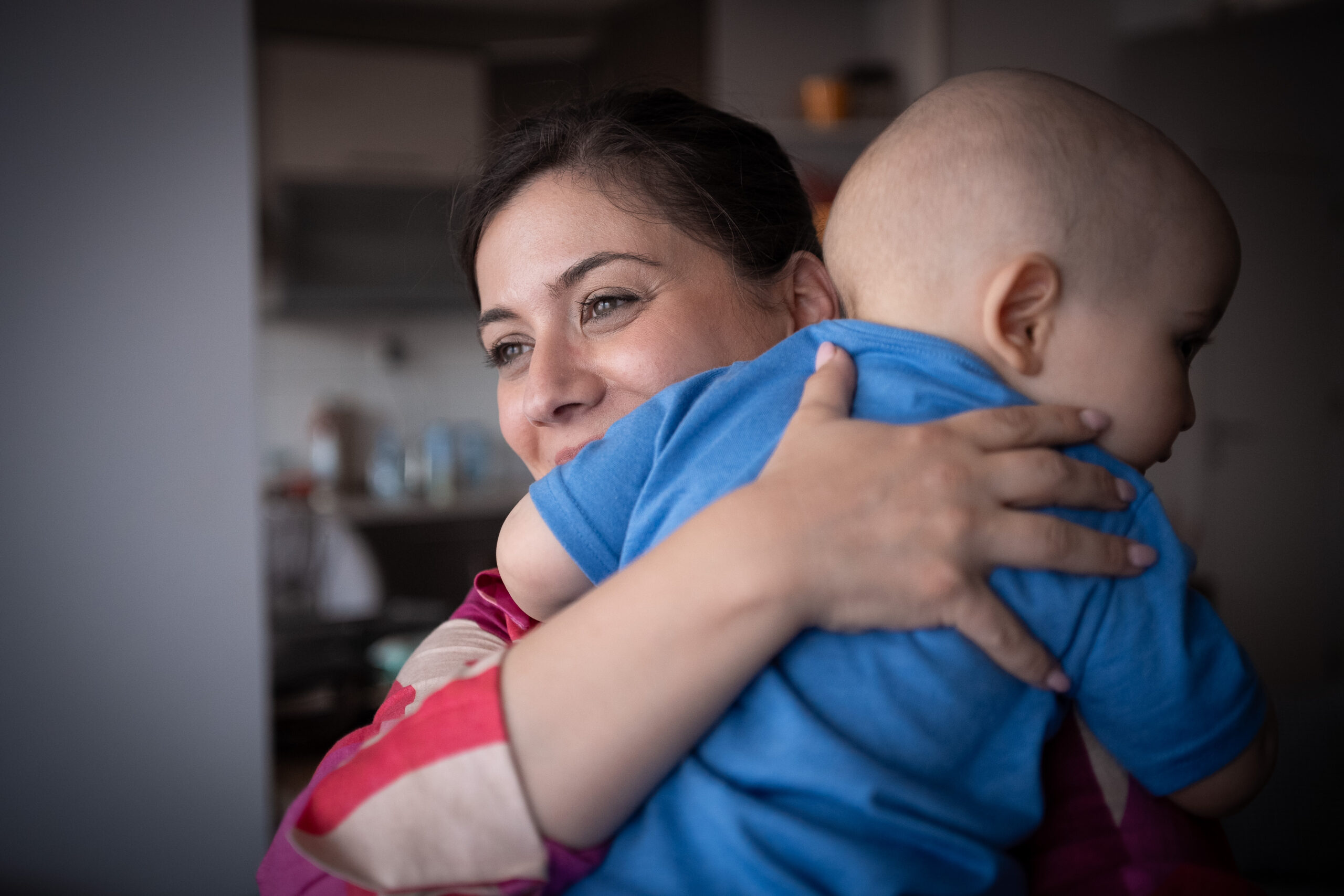
Aulonë Mehmeti, 35, from Prishtina
Photo: Ferdi Limani / K2.0.
On June 26, 2024, Arianit and I became parents for the first time. I was excited, prepared and happy. Before we left for the hospital, we took a few photos, got dressed and felt ready to experience what I believed would be the most important moment of my life.
When I saw Gjergj for the first time, everything around me stopped. It was as if the world ceased to exist and only he remained. I had dreamed of that moment throughout my entire pregnancy — which, although not the easiest, passed without any major complications. I believe Arianit cried too; he even saw him before I did. Gjergj was so small and warm and I felt a deep tenderness for him, especially because he was crying so much.
For the first two or three hours, I felt indescribable happiness. But then I was suddenly overcome by a sense of emptiness, an immediate emotional downturn. These feelings peaked on the third day, to the point that a nurse at the clinic told me I was experiencing symptoms of the baby blues. At the same time, I felt guilty for not feeling what everyone described as “the most beautiful thing in the world.” For me, it didn’t come naturally.
Breastfeeding was another challenge. They told me that Gjergj was latching well, but I felt severe pain and couldn’t manage it properly. In the end, I had to supplement with formula.
When we got home, everything changed. There was no manual, no protocol, no clear instructions. I knew in theory that babies wake up every two to three hours to feed but I hadn’t imagined how difficult it would be in practice. It was exhausting. I couldn’t tell if he was crying from hunger or stomach pain, I felt helpless. Stress overwhelmed me every time he cried because I didn’t know what else to do. I tried everything, changed his diaper, gave him colic drops, used every remedy I could think of — but he still cried and I felt powerless. I had never experienced that kind of stress before. I’ve worked under pressure for years, carrying great responsibilities, but this was the hardest “job” of my life.
No one asked how I was. Everyone was focused on the baby, but I needed someone to ask about me.
In the first few days, Arianit was with us and people called to congratulate. But after about three weeks, it felt as if everyone assumed I had everything under control. In reality, that’s when things started to get even harder. Arianit returned to work, while I was left feeling tired, sweaty, with hair I hadn’t washed in days. I felt like I was constantly giving without receiving anything in return, until I was completely drained.
No one asked how I was. Everyone was focused on the baby, but I needed someone to ask about me. In fact, now that I think about it, only my parents, my sister and my cousin asked, “how are you?” That meant so much to me as a new mother. One day, my cousin called and said, “I’m not asking you about Gjergj, because I know you’re taking care of him, I’m asking you — how are you?” At that moment, I broke down in tears.
When two months had passed since I gave birth, I realized that these feelings weren’t just temporary. Whenever I talked to other mothers, their response was always the same: “Come on, we’ve all been through it.” But the women who had become mothers before me didn’t face the same pressure of having to earn an income. I thought about going to a psychologist, but time was the biggest issue. I had even postponed a routine Pap test for a month and a half. Finding the time to see a psychologist… it’s just hard to manage anything as a new mother.
I think I went through a very depressive period. I’m better now but I still have difficult phases — three or four dark days, followed by better ones. I often feel a deep anger, especially toward the system and the inequality within it. I know that no one but myself can truly help me and I know these feelings are temporary. But I also believe that society needs to understand that yes, becoming a mother is a beautiful experience — but it’s just as important to talk about what happens after you become a mother.
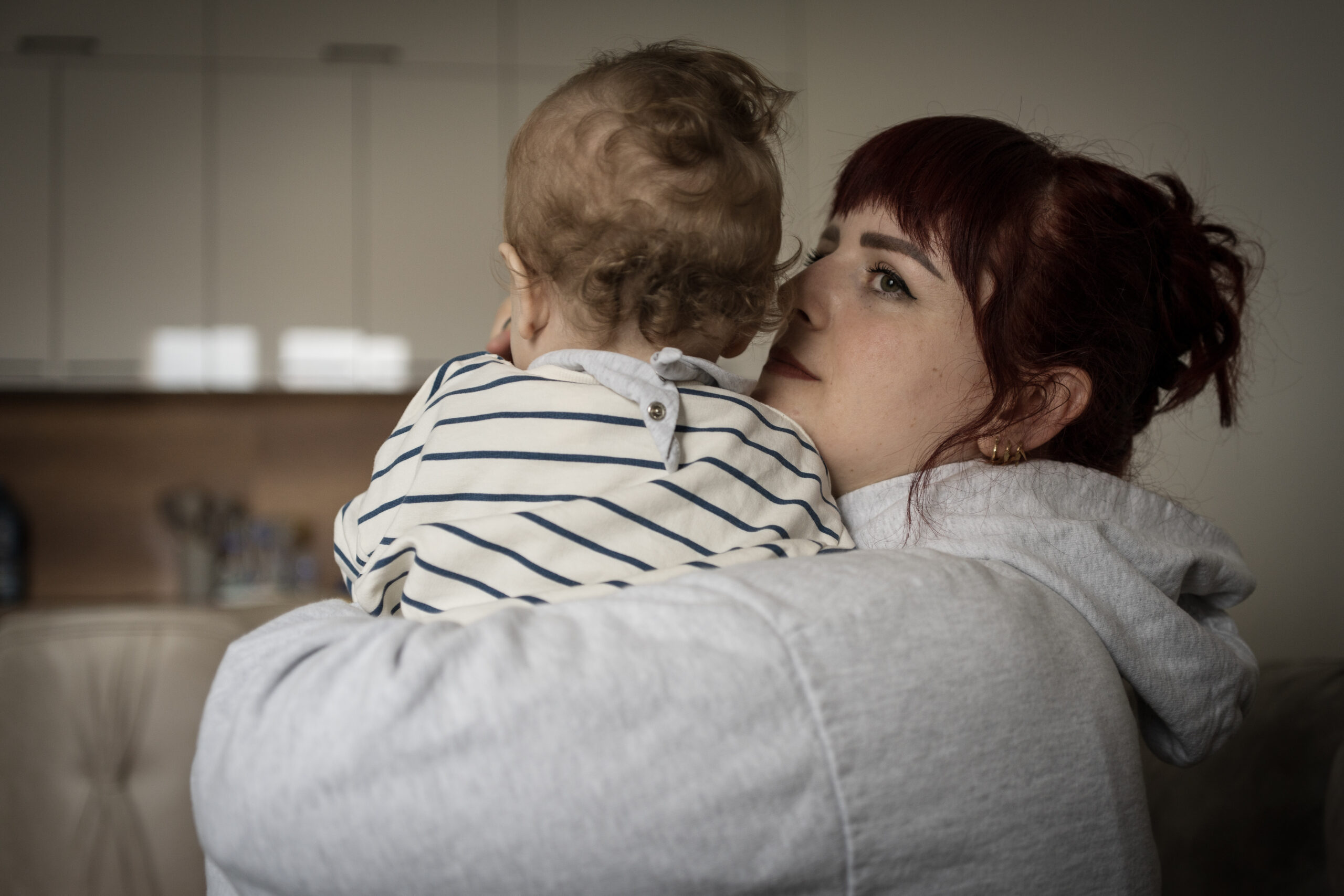
Besarta Breznica, 28, from Prishtina
Photo: Ferdi Limani / K2.0.
I had a very uneventful pregnancy, aside from the constant worry I felt about giving birth. I’m someone who tends to get anxious about the unknown, childbirth was one of those unknowns. I had heard many stories from women — stories of trauma, pregnancy loss, severe complications and unbearable pain. For someone like me, who becomes anxious when facing uncertainty, hearing those stories made the idea of giving birth feel traumatic even before it happened.
I also entered pregnancy with a persistent fear of losing my baby. I had heard so many stories of women who had experienced loss that every change in my body made me think something was going wrong. As a result, I visited the gynecologist every two weeks out of panic. Because of this anxiety — and also because the baby was in a delicate position — I ended up having a cesarean section.
On April 12, 2024, I gave birth to Gega, and just when I thought the anxiety and stress were behind me, I faced a new challenge. Due to the shape of my breasts, my son couldn’t breastfeed. That was my first emotional breakdown. Surrounded by so many women who were breastfeeding, I deeply wanted to experience it too. Despite my constant efforts and hours spent pumping, the results didn’t change. Everyone kept repeating the same phrase — one that started to feel like a ringing in my ears; “There’s nothing like a mother’s milk.” That’s when I started feeling sorry for myself. It seemed like my body was failing me at something that’s supposed to be entirely natural. Even though the women around me could see how much I was struggling, not one of them suggested using formula. Instead, they all said, “Keep trying until the end.” That made me feel constantly inadequate.
I often felt misunderstood by the women in my family. There were moments when they told me, “You’re overreacting, the baby is fine. If you had real health problems, you wouldn’t be crying.”
My emotional state was deteriorating as Gega cried nonstop. There were moments when I cried with him. That period was incredibly difficult for me — there were times when he cried so much that I didn’t know how to soothe him. This went on for about four and a half to five months. And as anyone can imagine, hearing a baby cry constantly was not only exhausting but also deeply overwhelming. It made me feel even worse.
There were moments when I cried with him because I didn’t know what to do — I felt like I had no other options. I cried a lot and even now, I still cry from time to time. I often felt misunderstood by the women in my family. There were moments when they told me, “You’re overreacting, the baby is fine. If you had real health problems, you wouldn’t be crying.” Those words made me feel even worse, because the issue wasn’t with the baby. Of course, I was happy to have become a mother — my emotional state had nothing to do with the baby himself. The problem was that no one asked how I was doing anymore. During pregnancy and after birth, the entire focus shifted solely to the baby.
Even the care that women believe they’re receiving during pregnancy is not truly for them, but for the fetus — and that same dynamic continues after birth. The care is always directed toward the other.
I read a lot about the symptoms I was experiencing but I was late to start psychotherapy because I lacked the courage to see a psychologist, even though I had done therapy before. After giving birth, it was difficult for me to take that step and talk to someone about how I was really feeling.
In addition, I struggled to find the time to see a psychologist because there was no one to take care of the baby except me and my partner, and he was at work most of the time, which made it difficult to manage. I eventually started psychotherapy eight months after giving birth. I think it was too late. I believe it’s better to talk about difficult moments as they happen, because even if you don’t talk about them, they build up inside you — and by the time you get to the psychologist, what is it that comforts you first?
Now, a year after Gega’s birth, I feel like I’m doing better. Returning to work has helped as well — for me, it has felt like a return to normalcy, a return to something I’ve done all my life.
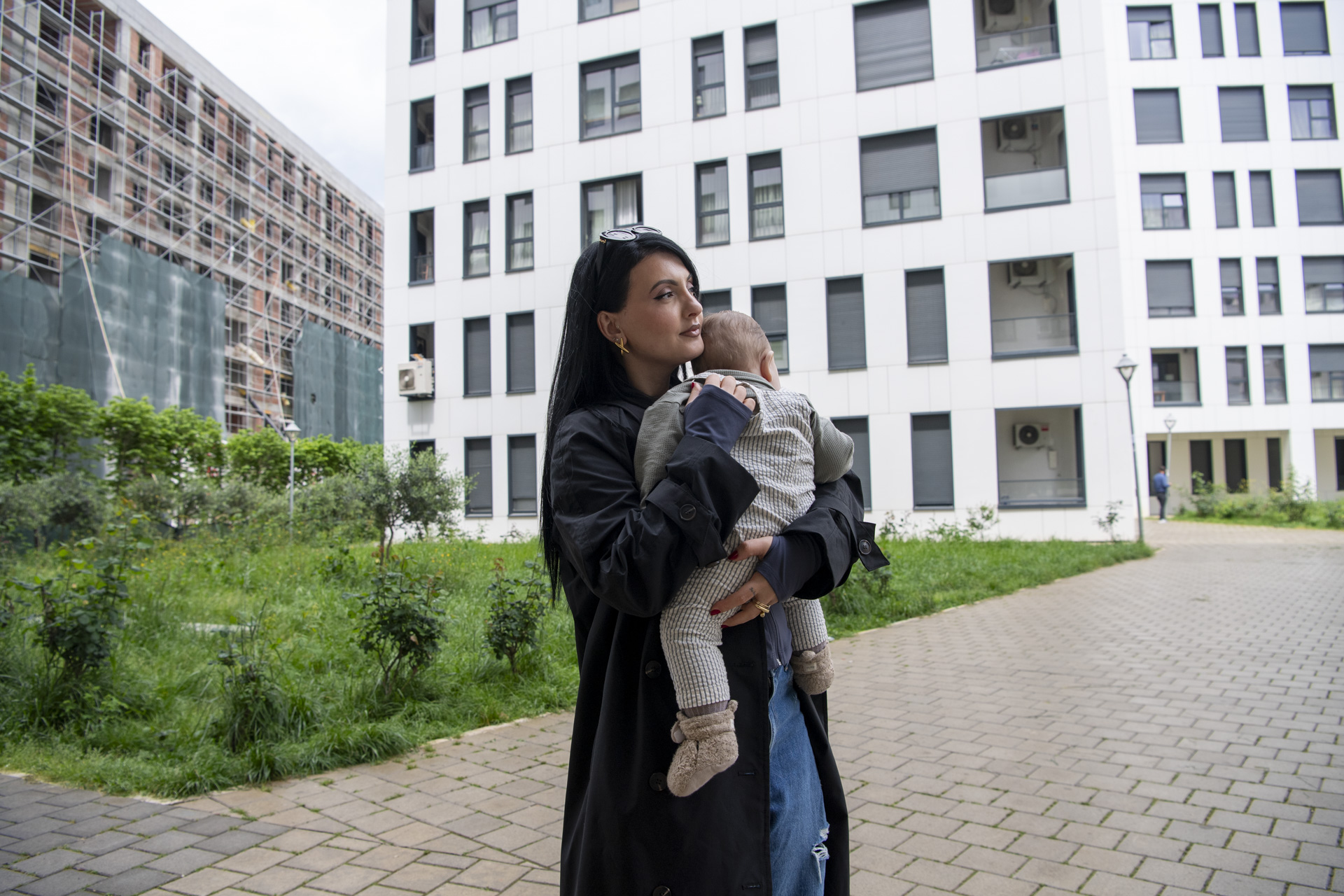
Klaudia Kastrati, 29, from Tirana
Photo: Atdhe Mulla / K2.0.
It was 2020 — a time of a pandemic and isolation — when I found out I was pregnant for the second time. Unlike my first pregnancy, this time I felt a tightness in my chest the moment I saw the two lines on the test. I had become a mother only a year earlier and was fully immersed in that experience, enjoying every detail of it. My bond with my eldest son was strong and the thought of becoming a mother again left me in shock. How would I take care of two babies at the same time? Would I be able to give them both the love and attention they deserved?
My emotional state worsened even more when I shared the news with others. They told me, “you’ve ruined your life with this second pregnancy. You won’t be able to function as a human being anymore — only as a mother doing her duty.” Unfortunately, these comments came from people within the inner circle we usually consider “sacred.” I know people often speak without thinking, but they rarely consider the emotional impact their words can have — especially when you’re already going through something so vulnerable.
The birth of my second son was another traumatic experience. He was born without signs of life, and I nearly lost my own during childbirth. Just a few hours later, he was transferred to a state hospital, where he spent two weeks in intensive care. During that entire time, I didn’t rest for a moment. I didn’t have time to feel afraid or even to cry. It was as if I had turned into a robot. I would care for my older son at home, then rush to the hospital to be with my newborn. I wasn’t truly living — I was merely existing, serving my two children.
Negative thoughts took over me. I was overwhelmed by a deep sense of inadequacy.
Everything I had experienced came crashing down the moment I brought my little boy home. It felt like an unexpected wave suddenly hit me. All at once, everything went dark. Reality seemed distant, blurry. I couldn’t feel joy in what was supposed to be the happiest moment of my life. I couldn’t look at my children and say, “We did it, we’re together.” If I had to describe that feeling, it would be darkness — a complete disconnection from the reality I was living.
Negative thoughts took over me. I was overwhelmed by a deep sense of inadequacy. I carried out all the duties of a mother mechanically — feeding, changing diapers, taking care of both children — but without feeling anything. My relationship with my eldest son also began to suffer. There were no more cuddles, no more kisses. He felt my distance. Sometimes, he wouldn’t come near me at all.
One night, he refused even the slightest touch. He wouldn’t let me stroke his head. My heart broke. I cried, begging my child to let me hold him. That’s when I realized I had reached a breaking point — something had to change. I didn’t sleep that night. I thought long and hard about how I could help myself, how I could get out of this situation.
For me, recovery was a battle — an internal process, a personal struggle. I didn’t seek professional help, but each day, with small steps, I tried to find myself again. I believe that as long as we’re able to help ourselves, no one else can do it for us.
Feature Image: Mashal Baloch / K2.0
Dëshironi të mbështetni gazetarinë tonë?
Në Kosovo 2.0, përpiqemi të jemi shtyllë e gazetarisë së pavarur e me cilësi të lartë, në një epokë ku është gjithnjë e më sfiduese t’i mbash këto standarde dhe ta ndjekësh të vërtetën dhe llogaridhënien pa u frikësuar. Për ta siguruar pavarësinë tonë të vazhdueshme, po prezantojmë HIVE, modelin tonë të ri të anëtarësimit, i cili u ofron atyre që e vlerësojnë gazetarinë tonë, mundësinë të kontribuojnë e bëhen pjesë e misionit tonë.
Anëtarësohuni në “HIVE” ose konsideroni një donacion.
